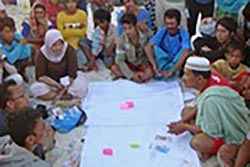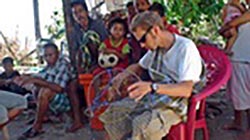The Social-Ecological Systems (SES) Analysis Work Group investigates feedbacks between social and ecological dynamics in tropical coastal and marine social-ecological systems (CM-SES). In contrast to purely terrestrial or marine SES, CM-SES, located in the margin between land and deep ocean are particularly diverse in forms of use and governance. We work on human-nature interactions and their governance in mangroves, coral reefs, atolls, upwelling areas and river estuaries. In the context of ongoing environmental change, we focus on key coastal sustainability problems including ecosystem and resource degradation and overuse, coastal poverty and on CM-SES governance and management.
While we work with various SES concepts, our main working definition regards an SES as multi-level from local to global and linking actors that affect or are affected by a particular issue or problem at a focal spatial or institutional level.
Our analysis of the characteristics and dynamics of CM-SES focuses on:
- Equity in coastal livelihood dynamics under conditions of change in the natural environment
- Formal and informal institutions, and the roots of social energy for the conservation and sustainable use of coastal and marine areas
- Social and social-ecological network characteristics and types in the governance of CM-SES
- Methods for SES analysis including multi-agent modelling and qualitative, quantitative and inclusive participatory approaches
To better link the diverse knowledge systems (of social and natural sciences, engineering, the humanities and the arts, fisherfolk and other ecosystem users, political decision-makers and others) around identified issues in the tropical coastal and marine realm, and to enable inter-and transdisciplinary collaboration, we develop and interface methods for social-ecological systems analysis.
Our Work Group’s ZMT level and global cooperation partners are complemented by various networks of national collaboration partners mainly but not exclusively in Bangladesh, Brazil and Indonesia.
In 2018, work group leader Dr. Marion Glaser PD was appointed as Vice-chair of the global interdisciplinary science project Integrated Marine Biosphere Research (IMBeR).
Further research projects
Sea of Connections-Pacific (SOCPacific)
Social-Ecological Networks and MPA management (2017-2020)
Social Drivers of Coral Reef Resilience in the Cooperative Project "Understanding and Managing the Resilience of Coral Reefs and Associated Social Systems" under the SPICE Programme Science for the Protection of Indonesian Coastal Ecosystems (2012-2016)
MPAs that work: Institutional solutions for sustainable coastal and marine systems (2011-2014)
Coastal resources, livelihoods and innovation (2011-2014)
Coastal livelihoods and food security in the Cooperative Project "Impacts of Marine Pollution on Biodiversity and Coastal Livelihoods" under the SPICE Programme - Science for the Protection of Indonesian Coastal Ecosystems (2012-2015)
System Transformations in the Face of Environmental Change under the SPICE Programme - 2012 - 2016)
Oceans Past Platform COST Action IS1403 (2015 - 2017)
Science for the Protection of Indonesian Coastal Ecosystems (SPICE IIGovernance and Management of Indonesian Coastal Ecosystems) (2007-2012)
Mangrove Dynamics and Management, Brazil (1996-2005)






